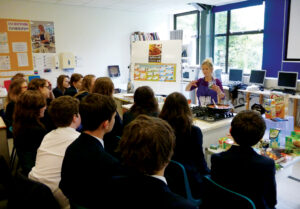Talking to Young People About Veganism
Animal Aid runs a very successful School Speaker programme that consists of volunteers who go to schools and talk to students about veganism and animal rights issues, as well as delivering plant-based cookery demonstrations.
By Diane Smith. School Speaker Training Officer.
Education plays a big part in Animal Aid’s work – we know that informing young people about animal rights and veganism is crucial in bringing about change. Virtually all children have empathy towards non-human animals from a very early age and we aim to nurture this through our work in schools. Our school speaking programme involves training volunteer speakers to give talks in primary and secondary schools or remotely, and over the years we’ve developed resources and strategies to get our message across effectively.
 Our approach in primary differs from that in secondary schools of course; with younger students we have to deal more sensitively with the issues because they could become distressed. Our primary scheme, Animal Kind, focusses on animals having feelings and ways children can help the animals around them.
Our approach in primary differs from that in secondary schools of course; with younger students we have to deal more sensitively with the issues because they could become distressed. Our primary scheme, Animal Kind, focusses on animals having feelings and ways children can help the animals around them.
In secondary schools we can be more open about the way animals are treated but we’re careful to allow students to express their views and make sure they’re comfortable sharing their opinions; we find group work and Q & A sessions facilitate this. We strike a balance between being honest about what really happens to animals and being encouraging rather than judgemental.
Our vegan cookery demos are a positive and fun way to engage with students and we’ve recently had demand for them in primary schools. This not only helps young children to become familiar with the word ‘vegan’ but also allows them to sample tasty vegan food, which  results in veganism becoming more accepted. Our volunteers get great feedback from teachers who might comment that their students have started an animal rights group, have become vegan or have lobbied for change in the school canteen.
results in veganism becoming more accepted. Our volunteers get great feedback from teachers who might comment that their students have started an animal rights group, have become vegan or have lobbied for change in the school canteen.
Find out more about Animal Aid’s Education department: https://www.animalaid.org.uk/education/
